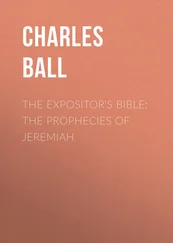Charles Bradlaugh - The Bible - What It Is!
Здесь есть возможность читать онлайн «Charles Bradlaugh - The Bible - What It Is!» — ознакомительный отрывок электронной книги совершенно бесплатно, а после прочтения отрывка купить полную версию. В некоторых случаях можно слушать аудио, скачать через торрент в формате fb2 и присутствует краткое содержание. Жанр: foreign_prose, на английском языке. Описание произведения, (предисловие) а так же отзывы посетителей доступны на портале библиотеки ЛибКат.
- Название:The Bible: What It Is!
- Автор:
- Жанр:
- Год:неизвестен
- ISBN:нет данных
- Рейтинг книги:5 / 5. Голосов: 1
-
Избранное:Добавить в избранное
- Отзывы:
-
Ваша оценка:
- 100
- 1
- 2
- 3
- 4
- 5
The Bible: What It Is!: краткое содержание, описание и аннотация
Предлагаем к чтению аннотацию, описание, краткое содержание или предисловие (зависит от того, что написал сам автор книги «The Bible: What It Is!»). Если вы не нашли необходимую информацию о книге — напишите в комментариях, мы постараемся отыскать её.
The Bible: What It Is! — читать онлайн ознакомительный отрывок
Ниже представлен текст книги, разбитый по страницам. Система сохранения места последней прочитанной страницы, позволяет с удобством читать онлайн бесплатно книгу «The Bible: What It Is!», без необходимости каждый раз заново искать на чём Вы остановились. Поставьте закладку, и сможете в любой момент перейти на страницу, на которой закончили чтение.
Интервал:
Закладка:
We learn from such works as the 'Sermons in Stones,' that the warmest advocates of scriptural history find so glaring a discordance as to immediately compel them to relinquish the literal version; with the strongest faith they cannot believe in light before the sun – they cannot reverse the order of the different strata as revealed by the science of geology, and they therefore tell you that you must call in your fancy (or rather their fancy) to the aid of your revelation, and, by subtracting from, or liberally adding to, the words of the text, they will melt the strongest contradiction. You must read prayerfully, that is, you must be prepared to cast away your senses every time they are opposed to your Bible.
'In the beginning God created the heaven and the earth.' The word here translated God is [ – ] (Alehim or Elohim) which is a plural noun ( vide Parkhurst's Hebrew Lexicon, article [ – ], and although translated by the singular word God, it is often associated with plural adjectives, pronouns, and verbs, see Genesis, chap, i, v. 26, chap, iii, y. 22, chap, xi, v. 7; nay more, on the same orthodox authority we learn, that in many other passages the translators have ignored the plural accompaniments for the purpose of supporting the orthodox theory, and yet we are told in the present day that the Bible does not want retranslation. It has been before pointed out that there is a double creation narrated, one from Genesis, chap, i, v. 1 to chap. ii, v. 3; in this the only word used is the plural word Alehim, or the Gods (that is, if Alehim be either God or Gods as it has been differently translated; elsewhere we find the expression 'God' applied to Moses – this would lead us to doubt as to the precise meaning of the word. I am told by some of my reverend friends that the meaning of the word God is varied according to the mode of printing; if with a capital letter 'God,' it means an incomprehensible anything they like, if with a small initial, 'god,' it means an inferior anything you like). Volney, in the notes to his 'Ruins of Empires,' says, 'If we further observe that the root of the word Elohim signifies strong or powerful, and that the Egyptians called their decans strong and powerful leaders, attributing to them the creation of the world, we shall presently perceive that the Book of Genesis affirms neither more nor less than that the world was created by the decans , by those very genii whom, according to Sanconiathon, Mercury excited against Saturn, and who were called Elohim . It may be further asked why the plural substantive Elohim is made to agree with the singular verb bara (the Elohim creates). The reason is, that after the Babylonish captivity, the unity of the Supreme Being was the prevailing opinion of the Jews; it was therefore thought proper to introduce a pious solecism in language, which it is evident had no existence before Moses. Thus, in the names of the children of Jacob, many of them are compounded of a plural verb, to which Elohim is the nominative case understood; as Raouben (Reuben), they have looted upon me , and Samaonm (Simeon), they have granted me my prayer , to wit, the Elohim. The reason of this etymology is to be found in the religious creeds of the wives of Jacob, whose Gods were the taraphim of Laban, that is, the angels of the Persians, and the Egyptian decans.' The other account commences with the fourth verse of the second chapter, and in this the words translated 'Lord God' are [ – ]; what these really mean it is impossible to say, unless they mean Chief of the Gods. Parkhurst translates it into a trinity. The word [ – ] (rendered in our version Jehovah) simply represents time past, present, and future. The two accounts differ considerably; in the first we find water forming an important feature, and ultimately drained off so that the dry land appears; in the second we have the land dry without water, and it becomes necessary to send a mist to water the face of the earth.
Genesis, chap, i, v. 1 to 27. Whoever wrote these verses must either have been an inspired man, a dupe, or a knave – that is, he could not have gathered from tradition, because here tradition is outstepped; it could not have been known by man, as he was not yet made; he must either have received it from God, or have been deceived by man, or must have intended to deceive man himself. If inspired, it is a pity God did not explain the creation of light before the sun ( verse 3), the creation of herbs and fruit trees bearing seed and fruit before there was a sun to ripen the fruit and bring the seed to maturity (verse 11), the creation of 'female-man' in his own image (verse 27), etc. By verse 29 it appears that God intended man to be a vegetarian; by Genesis, chap, ix, v. 3, he gave them all kinds of cattle for food; and by Leviticus, chap, xi, v. 12, he forbade man to eat certain kinds there specified; one of God's attributes notwithstanding all this is immutability. Chap. ii. v. 2 and 3, he rested on the seventh day and blessed it and sanctified it, because in it he had rested: – see Deuteronomy, chap, v, v. 12 to 15; which is the correct reason for the sanctifying the sabbath day?
Chapterii, v. 4. This, as it is translated, seems ridiculous: 'the generations of the heavens and the earth.' What is the meaning of this phrase? What are the generations? From a careful reading of verses? 5, 6, and 7, it would appear that God did not make man out of the dry dust; and that it was not until a mist had watered the whole face of the earth that he formed man. This may account for the creed of the negro, who believed that God made Adam from mud, and who assigned as a reason that dry dust would not stick together. In verse 9 are mentioned the 'tree of life' and the 'tree of knowledge of good and evil.' If these expressions occurred in the 'Arabian Nights' tales, we might not regard them as inappropriate, for in such books, which make no pretensions to truth, we expect to find tales of ghosts, witches, men carried off in fiery chariots, devils walking about bodily, donkeys speaking, and men passing through furnaces unhurt; but when we are told that a book is inspired by the God of truth, and in its early pages find mention made of a tree, by eating the fruit of which a man might live for ever, and that by eating of the fruit of another tree, a man would get knowledge of good and evil, with other fabulous expressions of a like nature, we cannot help a feeling of astonishment.
Of verses 10 to 14 Voltaire speaks as follows: – 'According to this version, the earthly paradise would have contained nearly a third part of Asia and of Africa. The sources of the Euphrates and the Tigris are sixty leagues distant from each other, in frightful mountains bearing no possible resemblance to a garden. The river which borders Ethiopia, and which can be no other than the Nile, commences its course at the distance of more than a thousand leagues from the sources of the Tigris and Euphrates; and if the Pison means the Phasis, it is not a little surprising that the source of a Scythian river and that of an African one should be situated on the same spot. We must therefore look for some other explanation, and for other rivers. Every commentator has got up a Paradise of his own.'
Dr. John Pye Smith suggests that the description is antediluvian, and that the deluge changed the courses of many streams; that hence we must not expect to find any spot conforming to the exact geographical description. If antediluvian, Moses did not write it.
'Verse 15. "The Lord then took the man and put him into the Garden of Eden that he might cultivate it."
Voltaire continues: —
'It is very respectable and pleasant for a man to "cultivate his garden," but it must have been somewhat difficult for Adam to have dressed and kept in order a garden of a thousand leagues in length, even although he had been supplied with some assistants. Commentators on this subject, therefore, we again observe, are completely at a loss, and must be content to exercise their ingenuity in conjecture. Accordingly, these four rivers have been described as flowing through numberless different territories.'
Читать дальшеИнтервал:
Закладка:
Похожие книги на «The Bible: What It Is!»
Представляем Вашему вниманию похожие книги на «The Bible: What It Is!» списком для выбора. Мы отобрали схожую по названию и смыслу литературу в надежде предоставить читателям больше вариантов отыскать новые, интересные, ещё непрочитанные произведения.
Обсуждение, отзывы о книге «The Bible: What It Is!» и просто собственные мнения читателей. Оставьте ваши комментарии, напишите, что Вы думаете о произведении, его смысле или главных героях. Укажите что конкретно понравилось, а что нет, и почему Вы так считаете.












